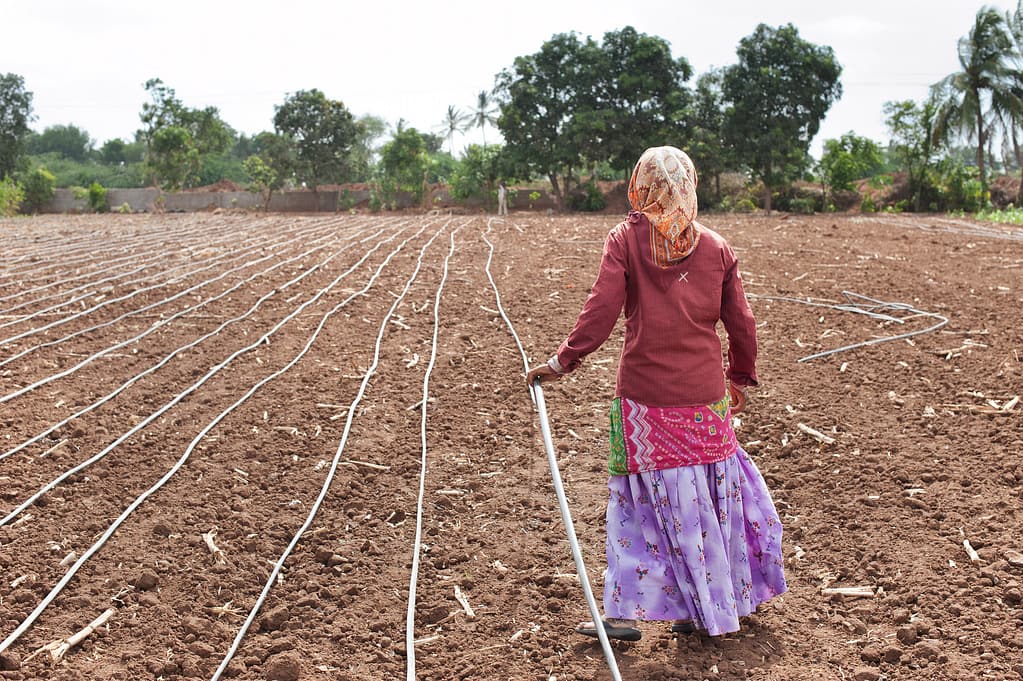By Maha Al-Zu’bi (IWMI) & Vijesh Krishna (CIMMYT)

On International Rural Women’s Day, the International Water Management Institute and the International Maize and Wheat Improvement Center (CIMMYT) celebrate the vital role women play in shaping sustainable water, land, and food systems, especially in rural regions facing resource challenges. Supported by the CGIAR Gender Platform, the two centers implement the “Learning in Tandem” project, which highlights the transformative power of women’s collectives across the Middle East and North Africa and South Asia. These collectives are driving gender equity and fostering resilience in agriculture by managing water resources, enhancing land productivity and ensuring food security. In Morocco and India, these collectives have adopted climate-smart farming practices, promoted water conservation and empowered women economically and socially. Their efforts highlight the importance of local leadership in building climate resilience and sustainable agricultural development, providing a blueprint for communities globally.
Women’s collectives: Guardians of water-dependent agri-food systems
Women’s collectives serve as a vital institution for sustainable water and other natural resource management within agri-food systems. In regions where water scarcity and inefficient irrigation threaten agricultural productivity, collective action among women is found to enhance water efficiency, promote conservation and ensure equitable access to water. Women collectives in Morocco and India ensure optimal resource use in agriculture by employing water-saving technologies, adopting climate-resilient crops and implementing drought-tolerant farming practices. These efforts not only sustain agriculture but also mitigate the impacts of water shortages, ensuring food security and long-term environmental health.
JEEViKA and collective action in Bihar, India deploy water-efficient techniques
The JEEViKA initiative in Bihar, India, is a powerful example of how women’s collectives can transform water and food systems. Supported by the World Bank, JEEViKA has mobilized over 12 million rural women into self-help groups, giving them access to financial services, markets, and sustainable agricultural practices. These women have adopted water-efficient techniques like drip irrigation and rainwater harvesting, ensuring the judicious use of water in farming. Their collective action has improved agricultural productivity and enhanced economic empowerment. The success of JEEViKA serves as an inspiring model for women’s collectives in MENA, demonstrating strategies to address water challenges and promote food security through similar grassroots efforts.

Moroccan Cooperatives champion organic and sustainable farming systems
The Mahssoul Tassaout Women’s Cooperative in Morocco exemplifies women’s critical role in advancing organic and sustainable agriculture. This initiative helps women gain financial independence by providing access to markets and training in agribusiness skills, leading to stronger livelihoods in the face of climate change. Despite challenges such as low labor market participation and limited formal qualifications—reflected in a national female activity rate of just 20% and 67% lacking formal training—women make up 51% of the agricultural workforce, particularly in rural areas where agriculture provides 91% of female employment. The Mahssoul Tassaout Women’s Cooperative highlights the potential for women’s collectives to drive climate-smart agriculture, overcoming social and structural barriers. By promoting organic farming practices, the cooperative showcases a model that could inspire similar initiatives in other regions, integrating gender perspectives into climate adaptation and agricultural sustainability efforts.
Conclusions and future outlook: Women’s collectives as champions of climate-smart agriculture and water resilience
Women’s collectives are vital to advancing climate-smart agriculture and water resilience, particularly in regions like MENA and South Asia, where water scarcity and climate change threaten food production. These collectives drive the adoption of water-efficient technologies, including water recycling systems and drought-resistant crops, ensuring the sustainability and adaptability of agricultural and water systems. Their leadership underscores the importance of integrating gender-sensitive approaches into water management and linking women’s empowerment directly to climate resilience and food security in rural communities. In addition to advancing sustainability, women’s collectives foster local leadership and social cohesion by empowering women to actively participate in community decision-making processes, which strengthens both system resilience and gender equality.
As we mark International Rural Women’s Day, it is critical to recognize the unique role of women’s collectives in addressing environmental challenges and promoting sustainable development. Their ability to implement innovative practices that foster climate resilience and food security demonstrates their capacity as agents of change in resource management. However, the future success of these efforts depends on increased collaboration, stronger policy support and the replication of successful models across vulnerable regions. Additionally, fostering knowledge exchange between women’s collectives across regions can facilitate the spread of best practices, ensuring that innovative solutions, such as water-saving techniques and climate-smart crops, are adapted to local conditions and scaled effectively.
Going forward, empowering women’s collectives through targeted policy measures and fostering cross-regional partnerships will be essential to maintaining long-term water and food security. Expanding access to financial resources, technical training and institutional support will further enable these collectives to scale their efforts and adapt to evolving climate conditions. Experiences from other MENA regions (e.g., Tunisia and Jordan) demonstrate that with improved access to microfinance and tailored technical training, women’s collectives can enhance productivity, build resilience and break socio-cultural barriers that hinder their participation in agriculture. By continuing to support and amplify the role of rural women, particularly through such comprehensive support systems, we can ensure a more resilient and sustainable agricultural future, especially in areas already strained by climate impacts and resource limitations.
This work is supported by the CGIAR Initiative on Fragility to Resilience in Central and West Asia and North Africa, and the CGIAR Gender Impact Platform

